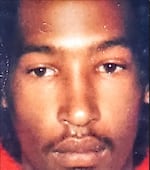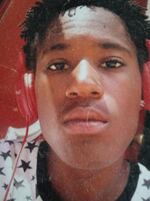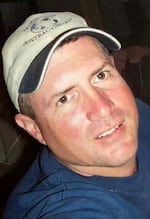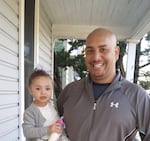
Portland families who have lost loved ones to police gathered together before heading to Washington, D.C., for the 2020 March on Washington.
Joe Keller
Nearly one hundred days after protests against police violence and systemic anti-Black racism began in Portland, demonstrators continue to take to the streets nightly. The protests started after George Floyd was killed by a Minneapolis police officer in late May.
As demonstrators continue to push for justice for Black men and women killed by police, “Think Out Loud” spoke to four Oregon families whose loved ones were killed by police.
Kayla Washington’s father, Jason Washington, was killed by Portland State University police in 2018. Donna Hayes’s grandson, Quanice Hayes, was killed by Portland Police in 2017. Joe Keller’s son, Deontae Keller, was killed by Portland Police in 1996. And Stephanie Babb’s brother, Brian Babb, who was white, was killed by Eugene Police in 2015.
The four families spoke to “Think Out Loud” about the loved ones they lost, and what it’s been like over the last few months as the intertwined issues of police violence and systemic racism have been so central to so many national conversations.
Deontae Keller

Deontae Keller was shot and killed by a Portland police officer in 1996.
Joe Keller
Joe Bean Keller remembers how his son Deontae Keller’s long 90s Jheri curl hung down.
Deontae was a good-looking young man, Keller said. He did gymnastics and played football and basketball, and lots of girls liked him. Deontae sometimes went by the name “Mack Tae” — a name that now belongs to Keller’s grandson.
“Since the women all liked him, he had to have a catchy name,” Keller said.
Deontae Keller was 20 when he was shot and killed by a Portland police officer in February 1996.
He had been driving through North Portland in a car with friends when an officer pulled him over, and Deontae fled. Keller said Deontae had about 1/10th of a gram of cocaine hidden in his underwear, and he didn’t have a license.
“It was the chance that he took,” Keller said. “That was a foolish move, but it happened.”
Then-Portland Police Bureau officer Terry Kruger shot Deontae as he fled. Keller said police let Deontae bleed out in the backyard of a nearby house for more than an hour before he died.
“It wasn’t worth dying for,” Keller said. “He wasn’t a gangbanger or anything like they tried to portray him to be.”
In the 24 years since, Keller has told his son’s story in hopes of getting Kruger criminally charged for his son’s murder.
In April, Kruger was placed on paid administrative leave from his position as West Linn’s police chief. His department is under investigation for the alleged wrongful arrest of Michael Fesser, a Black Portland man.
Keller said he spoke at one of the first Black Lives Matter protests in Portland, but has since felt somewhat removed from them. Keller said this is partially because he has worked to end police violence for 24 years since his son was killed, and isn’t sure why it took others so long to feel this angry.
“My thing is, why didn’t you start this conversation before someone had to lose their life from the police?” he said.
Keller sees himself as an ally and leader for other Portland families who have lost loved ones to police violence. Last week, he organized a trip for a group of these families, including Donna Hayes and Kayla Washington, to attend a civil rights march in Washington, D.C.
“These families ... needed to be there representing Portland, Oregon, because nobody else was gonna take that time to do that,” Keller said. “We can always think about George Floyd, Breonna Taylor, and all the rest, but we need to think about the Quanices, the Jasons … we cannot stop thinking about those people.”
Quanice Hayes

Quanice Hayes was 17-years-old when he was killed by Portland Police in 2017.
Courtesy of Donna Hayes
Donna Hayes always called her grandson Quanice by his childhood nickname: Moose.
On the day he was born, his mother took one look at him and said: “He looks like a moose!” And so, the nickname stuck.
“From that day, we brought him home from the hospital as Moose,” Donna Hayes said. “Nobody called him Quanice until after he died.”
Quanice Hayes was 17 when he was shot and killed by Portland Police Officer Andrew Hearst in 2017. The officer had been told by dispatchers Hayes was a suspect in an armed robbery, though it turned out the gun was a plastic replica. Police said that Hayes moved his hand toward his waistband while crawling toward them.
The Hayes family has filed a civil rights lawsuit against the city of Portland, accusing Hearst of using excessive force when he shot Quanice.
Now, Quanice Hayes’ name has become something of a rallying cry at protests against police violence and anti-Black racism in Portland.
Donna Hayes is glad the protests in Portland are reaching the 100-day mark. She believes they are necessary and hopes they will bring about change.
“I was somewhat thrilled that all over the world, people were fighting for Black lives,” she said.
She’s organized her own protests, as well: biweekly car caravans to show support for the Black Lives Matter movement. She wants the caravans to be a way for people who can’t participate in nightly protests to demonstrate safely.
Last week, Donna Hayes flew across the country to join thousands of other demonstrators in the civil rights march in Washington, D.C.
For Hayes, it was a welcome opportunity to connect with other Black activists. Many of the people in attendance also had family members who were killed or injured by police. And, Hayes said, it was powerful to see so many people gathered there for racial justice.
One morning, she got up at 2:30 a.m. to walk around downtown D.C. She talked with others that she met on the street — people who had traveled from Chicago, New York, Alabama. She handed them buttons with a message written on them: Justice for Quanice Hayes.
“I just want his name to stay alive,” she said.
Brian Babb

Brian Babb was shot and killed by a Eugene police officer in 2015.
Stephanie Babb
Stephanie Babb remembers her brother Brian Babb as the person she’d always call when she needed something.
Brian Babb was a captain in the Oregon Army National Guard. While serving in Afghanistan in 2006, he sustained a traumatic brain injury and struggled with severe post-traumatic stress disorder as a result. After his injury, he was honorably discharged from the military, and moved back to Eugene.
On the evening of March 30, 2015, Brian Babb was in a mental health crisis. He called his Veterans Affairs therapist and told her he was feeling suicidal. She then called the police to do a well check. Eugene police surrounded Babb’s house and brought in an armored vehicle. Officer Will Stutesman shot and killed Babb after he claimed Babb pointed a rifle at him. Babb’s family has denied he had pointed a rifle at police.
“It’s so ironic that somebody as alive and funny and engaging as my brother … they could just be gone in a heartbeat, literally,” Stephanie Babb said.
Growing up, Stephanie Babb had been taught to respect police. But her opinion of law enforcement changed after her brother’s death. It was difficult to get any information from police, she said, and her family was kept in the dark about what happened the night of her brother’s death.
“In the eyes of the law, we are not considered victims,” she said. “As soon as someone in your family gets killed by police, that association (with criminality) is there. Somebody just expects… that you’ve done something wrong.”
She has found strength and comfort in connecting with other families whose loved ones were killed by police. She’s organized vigils in Eugene to connect with other families and honor their loved ones. And, along with Donna Hayes, she is part of the Pacific Northwest Family Circle, a community group to support families whose loved ones were killed or injured by police.
The two women are on the group’s legislative directive task force, and have advocated for several changes to policing in Oregon, including getting rid of qualified immunity for police officers and requiring officers undergo mandatory drug testing after a shooting.
As a white woman, though, Babb believes her role in the Black Lives Matter Movement is to get other white people to pay attention by speaking about her family’s experience.
She recounts something Donna Hayes once told her at a rally they attended together: “We need people like you, that look like you, to tell your story because we need this to stop.”
Jason Washington

Jason Washington was killed by Portland State University police in 2018. Here, he holds his granddaughter, Kailee.
Kayla Washington
Kayla Washington remembers her dad Jason Washington as the type of person who everyone called their best friend.
“Anywhere you go, you’re gonna have a good time if he was there,” Kayla said.
Jason was shot and killed by two Portland State University police officers in 2018 as he was trying to break up a fight outside a downtown sports bar.
He was at a bar near PSU when his friend, who was legally armed, got into a scuffle with another patron. Jason asked his friend to give him his gun, so it would stay safe.
Two Portland State University police officers came to the scene as Jason tried to pull the person away from his friend. Jason fell, Kayla said, and so did the gun. As Jason tried to get up, the officers shot at him 17 times.
“And then they just let him sit there,” Kayla Washington said. “They didn’t help him after. That’s one thing that really bothers me.”
The Washington family has been calling for justice since Washington was killed. They advocated for Portland State University to disarm their campus officers, which the university agreed to do last month.
Kayla Washington said she was happy about the decision, but also a bit upset. She doesn’t understand why her father’s death wasn’t enough for PSU to disarm officers — they only decided after years of protesting, and more police killings of Black people.
“But I’m so happy to know that it actually worked, like the protesting worked,” she said. “It shows that this can work, and there can be change.”
When Black Lives Matter protests began in Portland three months ago after Minneapolis police killed George Floyd, she said she was initially overwhelmed.
“We felt like we had already been through that portion of our protests for my dad ... so it was like another round, like, OK, it’s coming up again,” she said. “But … it needed to happen, and we decided it could be our chance... to get justice as well.”
Washington wants to see a complete overhaul of the police system.
“To me, the policing system, it is like, when we were slaves, it’s the same thing. They have so much power that they can do whatever they want. And I think they need to be held accountable.”
Contact “Think Out Loud®”
If you’d like to comment on any of the topics in this show, or suggest a topic of your own, please get in touch with us on Facebook or Twitter, send an email to thinkoutloud@opb.org, or you can leave a voicemail for us at 503-293-1983. The call-in phone number during the noon hour is 888-665-5865.